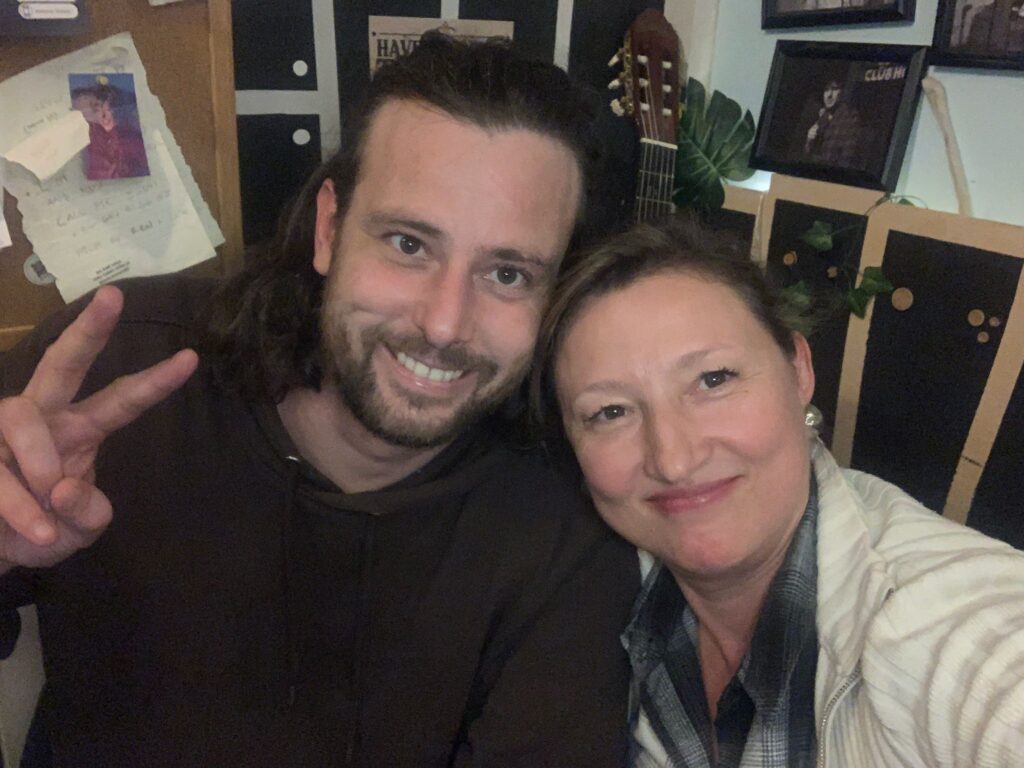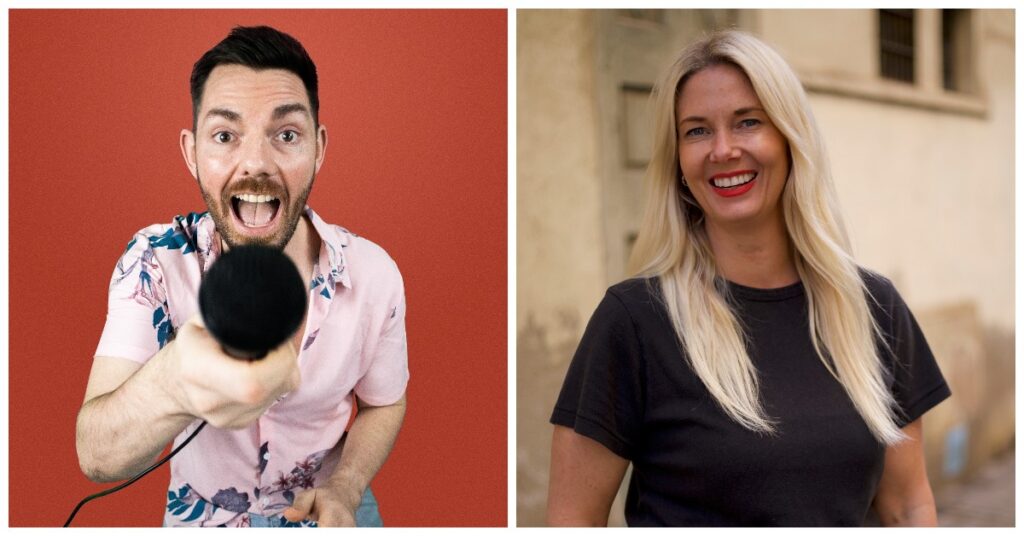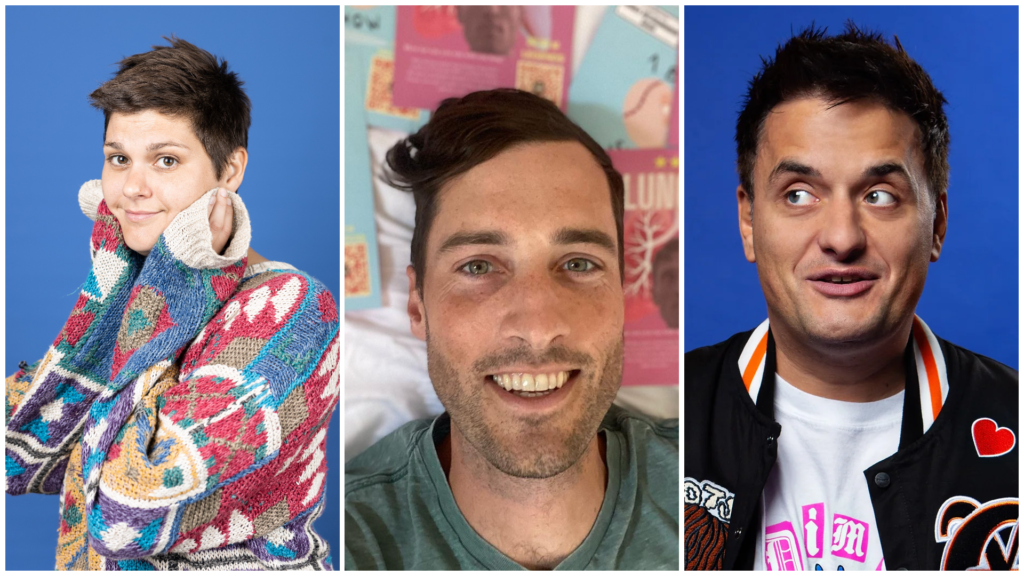‘BCN Comedy Vibes with John Allis’ by Yulia Peelovesky
John Allis, the Comedy Clubhouse Owner on Barcelona Fringe 2024: “I hope [the Barcelona Fringe] becomes a spot where comedians think, “Barcelona, great, I’ll spend 10 days there, make some money, cover my trip.”
As Barcelona gears up for its inaugural comedy Fringe Festival, we had the opportunity to sit down with John, a “motivational sleeper” in the local comedy scene. With his sharp wit and relaxed energy, John shares his insights on the festival’s vision, the vibrant comedy landscape in the city, and what audiences can expect from this exciting new event. Get ready for a deep dive into the world of laughter as we explore the stories behind the jokes.
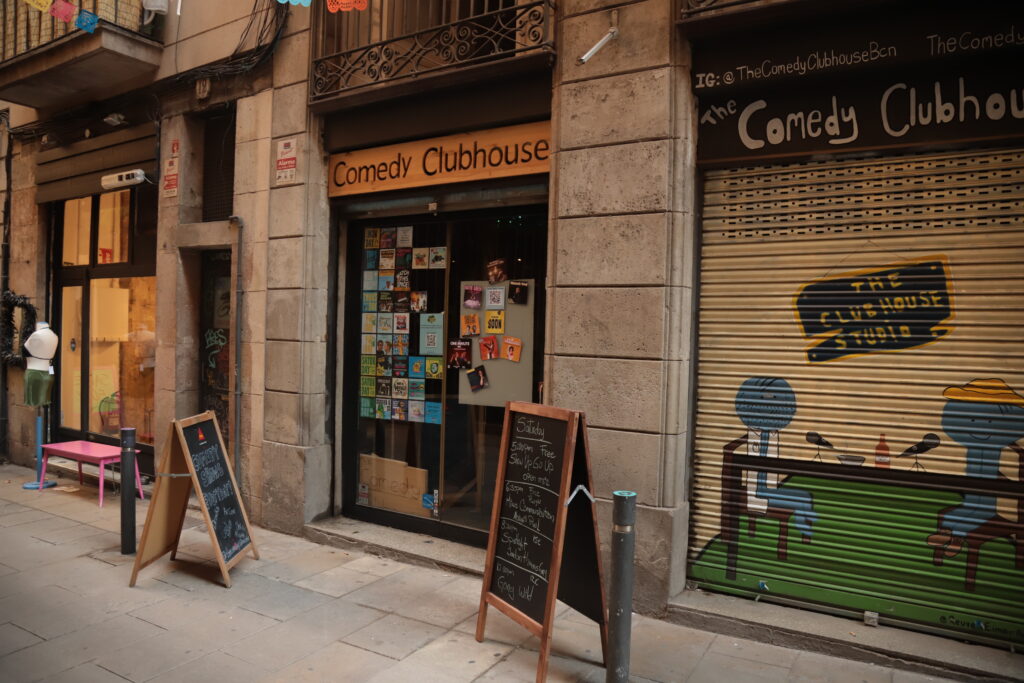
Yulia: John, as a main organiser of the first Fringe Comedy Festival in Barcelona, how did it all start?
John: Well, I’ve done the Edinburgh Fringe, and I know people who have done the Brighton and Adelaide Fringes. So it’s not too much of a leap to think, why not Barcelona? I was considering it, like “I wish we could do that,” never thinking it was actually possible. Then around March or April, my team started talking seriously about it.
Yulia: Amazing. It’s like Hannah said recently: it’s the Comedy Clubhouse attitude—“Let’s just do it! And now we’re doing it.” So, who’s in your team?
John: Hannah, James, Diana, Javi, Darren, Jamie—there are seven of us mainly involved with the Clubhouse, plus comedians, web designers, and others.
Yulia: Any good or bad surprises during the festival prep?
John: Sponsorships. I wasn’t able to organise much, so Alex Jacob took it on, contacting Ava and approaching bars and sponsors. They secured about 3,000 euros in sponsorships. We have a ski trip as a prize, free rent for a theatre, and Vistaprint printed all the programs. Vistaprint and Stoke Travel have been super helpful, and Michelle Wolf got involved—she’s headlining the biggest show at Golem’s and doing her own show here as well.
Yulia: That’s fantastic! So, what are your personal show recommendations?
John: There’s a flea circus by Adam Gertzikoff, a 50-year clown, with real fleas jousting and tightrope-walking. It’s on the last weekend, Saturday and Sunday at noon at the Clubhouse Café. Out of traditional standup, George Zacharopoulos, a European Comedy Award-winning comedian, is headlining the second Saturday. With 250 shows, I’d recommend people pick a day, get a programme, and read through it. They should read your blog with comedian interviews, follow our Instagram—we’re putting out a lot of info, but it’s hard to cover everything. I send daily emails, but each only covers five to ten shows, so it’s a lot of work. Or people can just pick Saturday or Sunday and just come down to the Clubhouse, where there are two shows running simultaneously all the time.
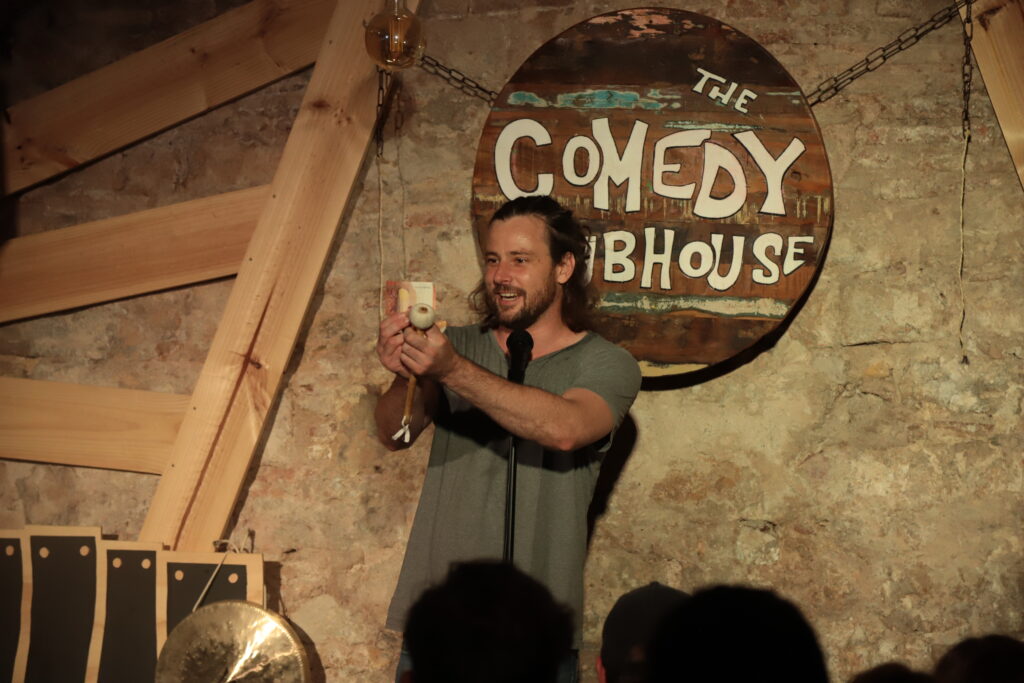
Yulia: Are you performing?
John: I’m hosting Gong Wild on the first Saturday at 22:30. It’s a comedy gong show—comedians try to last five minutes, and if they don’t make the audience laugh, I bang a gong, and they’re off. I also help promote Spotlight, Friday Night Live, Midweek Crisis, and TAB.
Yulia: With everything you do—comedy, organising, circus?!—what’s the weirdest skill you’ve picked up along the way? Can you juggle jokes and, I don’t know, oranges?
John: Honestly, there haven’t been many new skills picked up for the Fringe. The weirdest thing I can do is probably juggling fire while riding a unicycle, but I’ve done that since I was 15.
Yulia: Whaaaat? You can really do that!?
John: When I was young, I was really into street performing—unicycling and juggling. Weirdly, I wanted to be a clown, and now I’m kind of liking clowning again. It’s like I’m going back to it, but in a different, cooler way. I grew out of it, and now I’m growing back into it.
Yulia: Have you noticed the difference in New Zealand audiences? Is there anything you can say freely here that wouldn’t go over there?
John: I’ve performed in New Zealand, Chicago, and other places. New Zealanders tend to be a little reserved. They’re more like, “Alright, let’s see what this guy’s got to say,” compared to Americans, who’ve had a few drinks and really want to laugh. Here in Barcelona, people come not really expecting much, and when it’s funny, they’re pleasantly surprised. In New Zealand, people wouldn’t be drinking as much at shows because you have to drive, and drinks are expensive. They don’t like it when you drink and drive—real downers like that.
Yulia: Haha I see.
John: I don’t think Barcelona shows are really dirty or dark. Even The Offenders show… it could be darker. I guess I’m comparing it to London shows. Here, people are more open-minded and daring. Since it’s not a well-established professional scene, few people are making a living from performing, so you might as well say whatever you want. But in London, where it’s a career, every set has to kill, so it becomes harder to take risks.
I also performed in Chicago, where there’s sometimes a political ideology in the comedy scene that isn’t always healthy, leading to people just saying things the audience agrees with. You see that in Barcelona too, but there’s less risk because of the diverse backgrounds here. In any show, you might have people from 20 different countries, so you can’t just make a joke about loving Kamala Harris and expect it to resonate. There’s less reward for it.
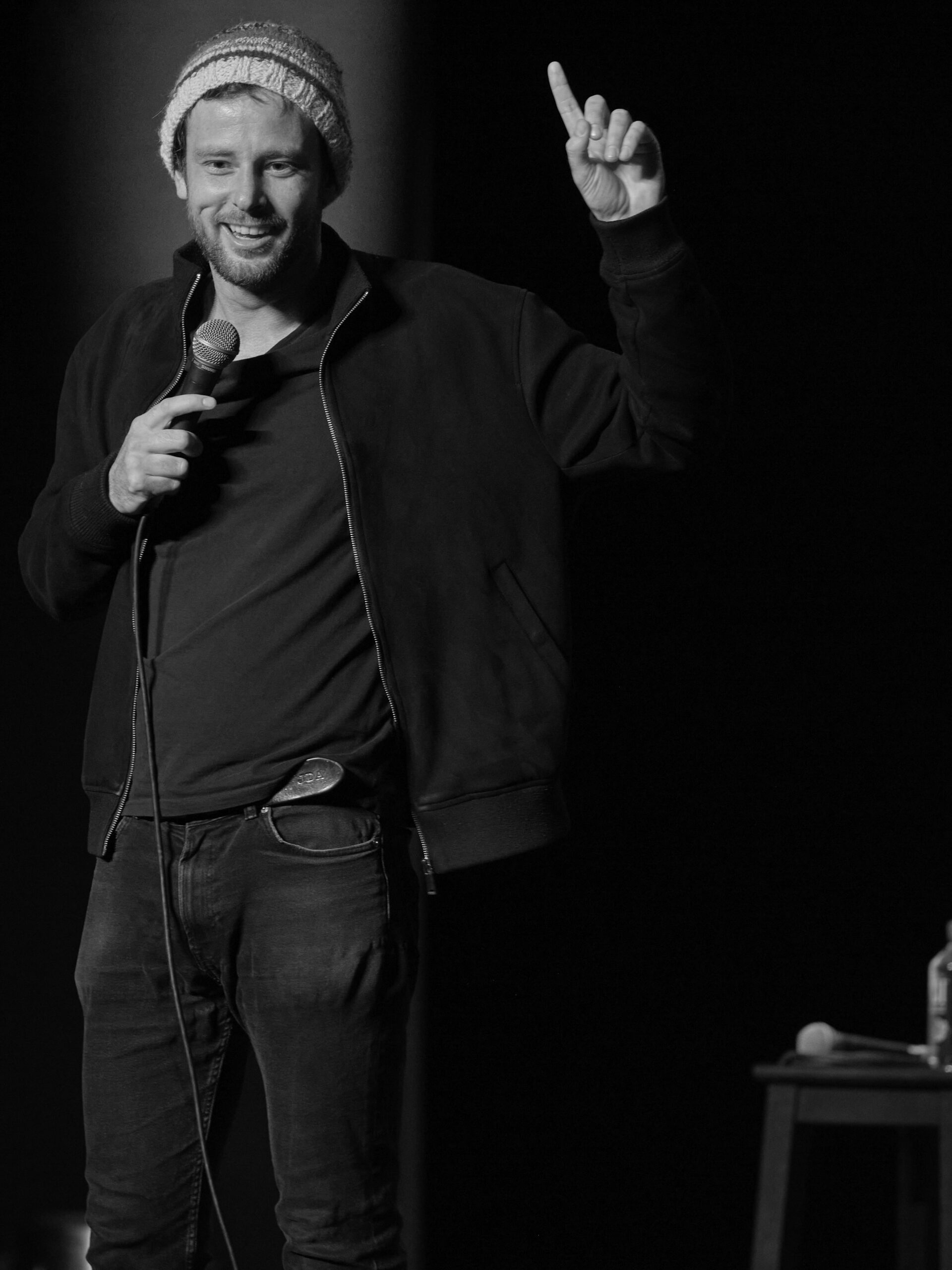
Yulia: For sure. So, you’re known as a “motivational sleeper” and “the hardest-working lazy person in the business.” What’s your secret?
John: Well, I’m not as lazy as I could be. I’m trying to be…
Yulia: Those days are behind you, right?
John: I’m trying to be more lazy. The last six months have been me starting Mondays not by asking, “What do I need to do?” but rather, “What does Vem, Diana, or Jamie need to do?” There’s a list of six people, and my main job is to make sure they know what they’re doing before I even start my tasks. So yeah, I mostly tell others what to do, which isn’t really what I like doing.
Yulia: Someone’s got to do it! You’ve written a children’s book, Stuffy the Stuffing. What’s harder: making adults laugh in a comedy club or capturing the imaginations of kids in print?
John: I wrote the book as a joke for myself, and for my nieces and nephews. Writing a successful children’s book is actually harder than making adults laugh.
Yulia: Why? Because you can’t swear?
John: No, because everyone’s trying to write a children’s book. There’s a lot of competition, and what floats to the top is… In terms of my book, I love it and I’m proud of it. Sometimes the writing just flows—you probably know this—it didn’t take tons of thinking, writing, or rewriting. It mostly happened in one or two days. I was really excited about it, and the illustrations too.
Yulia: The illustrations are beautiful!
John: Sarah approached me because I posted a silly poem on Facebook. She said, “Let’s do a children’s book,” and I actually had an idea. The illustrations make it a cool book, and the text too. I like that it has a message.
Yulia: So, readers can find your book on Amazon to learn that message, right?
John: Indeed.
Yulia: As a trained circus performer and comedian, do you ever think, “It’d be easier to juggle flaming swords right now”?
John: Comedy can be tough, especially with edgy jokes. The jokes I really want to tell are the hardest, right? Sometimes I think of an idea and go, “People won’t like this.” I don’t do it as much now, but I have a joke about the Make-A-Wish Foundation with a punchline about hoping kids with cancer die—not everyone’s cup of tea.
Yulia: Yeah, yeah.
John: But I get more satisfaction from a successful joke than I do from juggling. Juggling is the same every time; you put in the work, and you can do it. My level of juggling or unicycling isn’t even that good.
Yulia: It seems impressive to me!
John: It’s impressive because no one knows what you’re doing, so it looks impressive. But making people laugh at an idea they might disagree with—that feels genuine and real, and I love it.
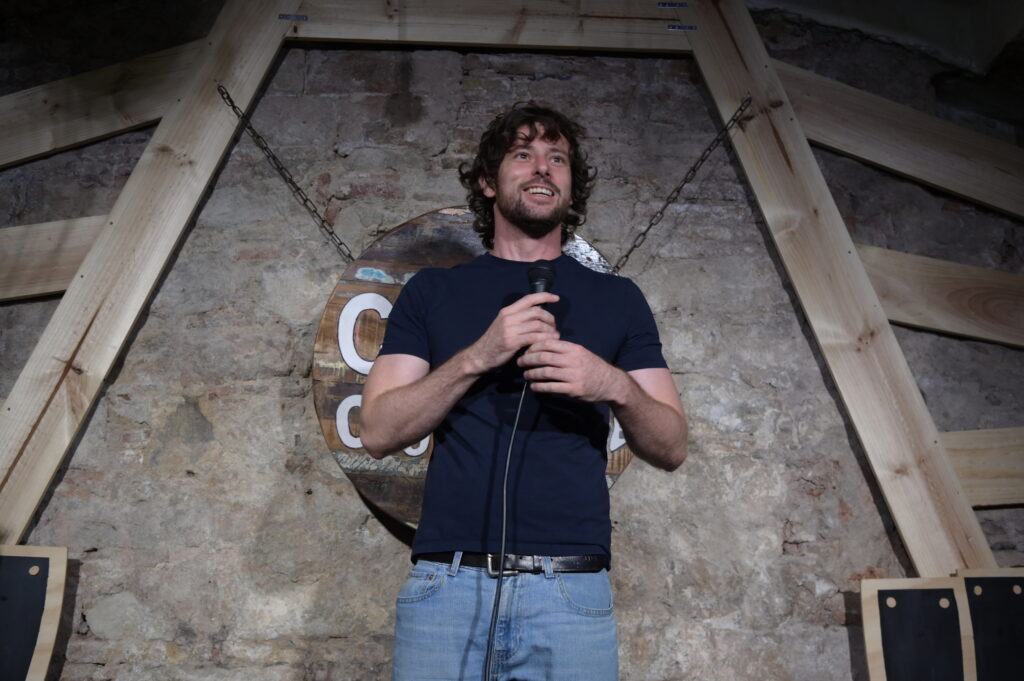
Yulia: So, it’s officially established: John is not a juggler at heart.
John: They’re completely different gears. If I’m juggling and unicycling, I’m in a totally different mindset than when I’m telling jokes. It’s almost impossible to imagine telling a joke that doesn’t work and then going like, hey, never mind, I’ll start juggling. It would be the weirdest juxtaposition of energies.
Yulia: Yeah, but I’d love to see you juggle and joke on stage someday! Alright, last question about the Fringe. What do you see happening in Barcelona’s comedy scene in five years? How will it impact The Comedy Clubhouse?
John: I don’t think the Fringe will affect The Comedy Clubhouse much, other than making it more well-known. It’s more of a Barcelona thing. Obviously, the Clubhouse is central, so I expect it to keep growing, selling out, and eventually charging more. But for Barcelona’s comedy scene, by next year’s Fringe, it wouldn’t be surprising to have €20,000–€50,000 in sponsorship—totally possible.
Yulia: That’s exciting!
John: I see more comedians moving here from tough scenes like Chicago, New York, London, Berlin. Barcelona could become an incubator for comedians, attracting people who want a break. And I hope the Fringe brings more Catalan, Spanish, Ukrainian, and more comedians. We could’ve had a Chinese show, for instance.
Yulia: Oh, wow!
John: I hope it becomes a spot where comedians think, “Barcelona, great, I’ll spend 10 days there, make some money, cover my trip.” That’s the sales pitch in two years!
This interview was hosted by Yulia Peelovesky, your unofficial “BCN Comedy Vibes: Fringe” blabber, spreading laughter and insights one cool AF comedian at a time!

